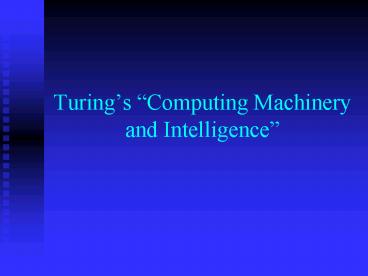Turings Computing Machinery and Intelligence - PowerPoint PPT Presentation
1 / 25
Title:
Turings Computing Machinery and Intelligence
Description:
Walking by the Thames, thinking about the nature of ... Turing invented what we now call (but Turing didn't call) 'the ... arguments could one adduce? ... – PowerPoint PPT presentation
Number of Views:135
Avg rating:3.0/5.0
Title: Turings Computing Machinery and Intelligence
1
Turings Computing Machinery and Intelligence
2
Background Alan Turing
- Invented the modern notion of "computer".
- How did he do this? Walking by the Thames,
thinking about the nature of mathematics. A
fundamental question Can everything mathematical
function be computed? What does "computing" mean?
- Turing invented what we now call (but Turing
didn't call) "the Turing Machine", which is the
abstract specification of what goes on in a
computer. So Turing spelled it out. - Other achievements
3
Replacing the question
- Turing wants to replace the question? Why?
- What's the replacement?
- The imitation game. What is the game?
- What advantage does the new question have over
the old?
4
Problems with machine performance
- Machine doesn't have a body - so can't demand a
performance. - We don't ask a human to race an airplane (Turing
was a runner), so we shouldn't ask the computer
to enter beauty contests.
5
Positive Arguments
- Does Turing give any?
- He does talk about storage capacity. (A capacity
of 109 would be enough.) - What possible arguments could one adduce?
- Here's one the constraints imposed by these
machines are really minimal. The question is how
such machines are programmed. And Turing isn't
saying that this has been done. Just saying the
question of whether machines can think boils down
to the question of whether a machine can be
programmed to play the imitation game.
6
Objections
- Most of the paper is Turings response to
objections.
7
Theological objection
- To say machines couldn't think is to place a
limitation on God. - Other problems with this objection?
8
Heads in the sand Could happen but it would be
bad.
- Turing says consolation should be available in
the possibility of the transmigration of souls.
9
Mathematical objection
- Well skip this one for now.
10
Argument from Consciousness - computers aren't
conscious
- You'd have to be the machine to be sure.
- Solipsism - Turing thinks that is the consequence
of accepting the argument from consciousness.
11
Other minds the general issue
- Skepticism about other minds I know my mind
through introspection. How can I know that others
have minds? - Solipsism perhaps Im the only mind.
12
Resolving the Problem of Other Minds
- Argument from analogy
- Behaviorism
- The explanatory power of folk psychology We
attribute beliefs and desires and other mental
states all the time its extremely helpful as a
theory. We probably couldnt get by without it. - Now think of Turings claim in this light its
really the same, but w.r.t. machines.
13
Arguments from various disabilities
- Computers can't enjoy strawberries and cream
- Machines can't make mistakes
- Argument from continuity of the nervous system
- Argument from informality of behavior
- Argument from ESP
14
Lady Lovelace's objection
- Computer can "originate" intelligence.
- Machines can't do anything new
15
Learning machines
- Take a cue from human evolution development to
create a machine capable of playing the imitation
game. - Develop a child-machine.
- Educate the machine.
16
What is a digital computer?
- Turing
- Store (instructions, data)
- Executive unit (individual operations)
- Control (reads store, directs executive)
- Haugeland
- Automatic formal systems
- Programming
- Algorithms heuristics
17
Formal systems
- Token manipulation systems
- Digital
- Medium-independent
18
Token manipulation systems
- Set of types of formal tokens
- Example king, pawn, etc. in chess
- Allowable initial arrangements
- Example starting position in chess
- Set of formal transformation rules
- Example in chess, a pawn may advance forward one
square at a time provided no other piece occupies
that square
19
Digitalness
- Characterizes techniques for making something
(eg. an arrangement of formal tokens) and later
identifying what was made - Digital means positive and reliable.
- Positive means reidentification can be absolutely
perfect (successful). - Reliable means reidentification almost always is
absolutely perfect.
20
Medium-Independence
- Physical medium in which a concrete system is
realized is not crucial - Not all physical media are suitable for a given
system, however. - (You can play chess with a simulated board on a
computer screen but not by using live frogs for
pieces!)
21
Automatic formal systems
- Physical device
- States may be interpreted as arrangements of
tokens in some formal system - Normal operation automatically changes states in
accordance with the transformation rules of that
formal system
22
Programming
- Using automatic formal system A to implement
automatic formal system B - Some states of A correspond to states of B.
- As A follows its rules, it automatically
implements the rules of B.
23
Algorithms vs. Heuristics
- Algorithm A sequence of instructions
(transformation rules for system A) that is
guaranteed to successfully carry out a specified
rearrangement of tokens (in system B) in finite
time. - Heuristic A sequence of instructions that is
fairly reliable in successfully carrying out a
specified rearrangement of tokens in finite time.
(What counts as success?)
24
Universal Machines
- Turing showed that there are automatic formal
systems capable of implementing any other
automatic formal system (given sufficient time
and memory) - Except for limitations of time and memory, modern
digital computers are universal machines.
25
Some questions
- Are artificial neural networks automatic formal
systems? - How is it that the same sequence of instructions
may be regarded as both an algorithm and a
heuristic? - In what senses can automatic formal systems
simulate systems which are not automatic formal
systems?































